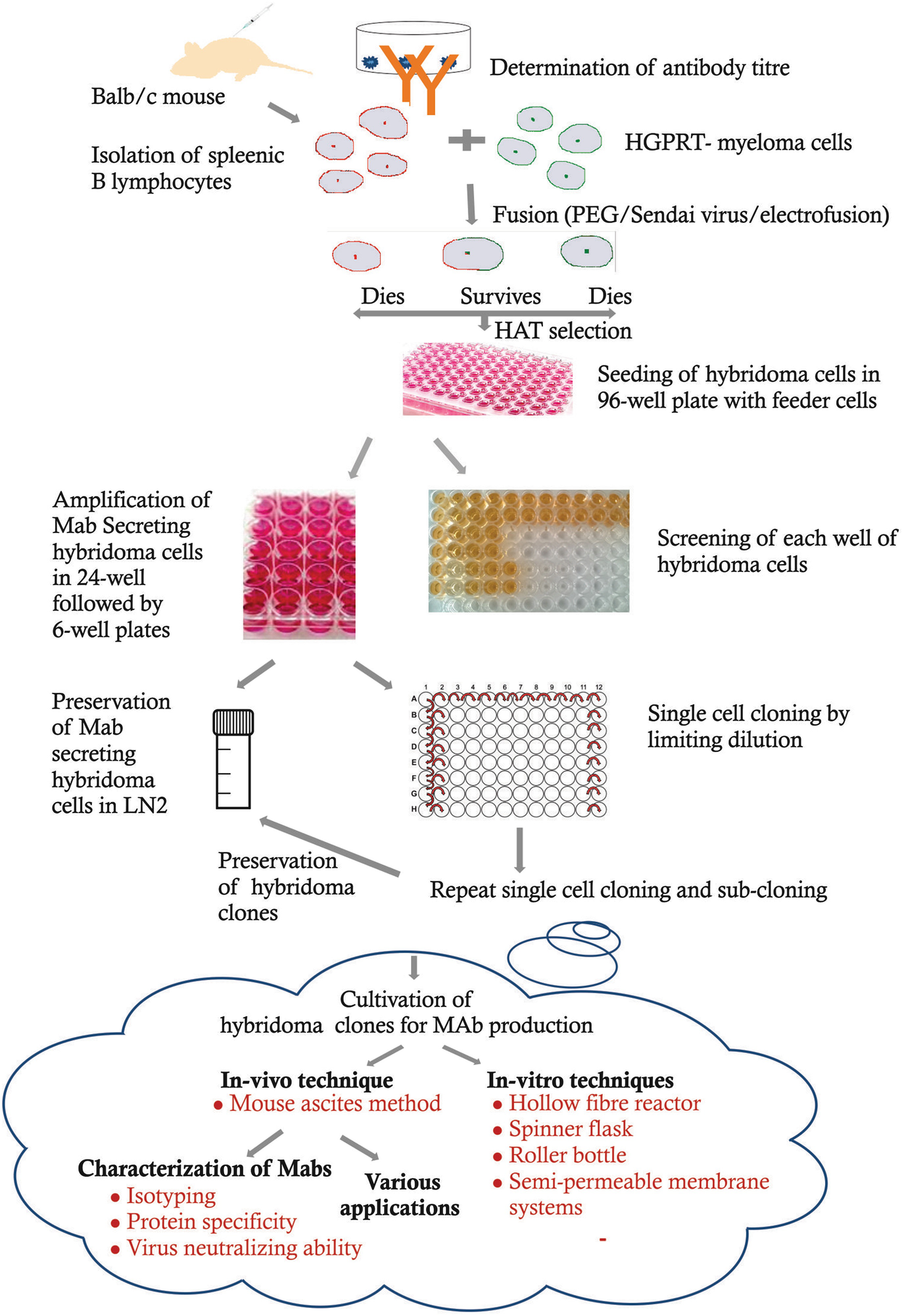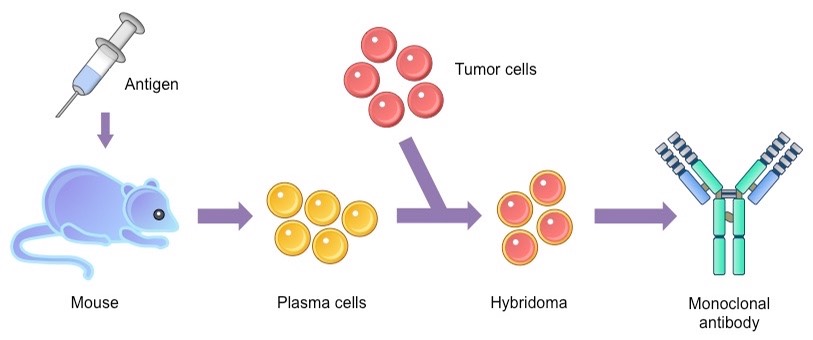Describe the Production of Antibodies Using the Clonal Selection Theory
Describe the production of antibodies using the clonal selection theory. Each lymphocyte bears a single type of receptor with a unique specificity.
The concept was introduced by Australian doctor Frank Macfarlane Burnet in 1957 in an attempt to explain the great diversity of antibodies formed during initiation of the immune response.

. Or diagram an immune response starting from infection and ending in specific immune response. Clonal selection is about lymphocytes. Clonal selection theory is a scientific theory in immunology that explains the functions of cells of the immune system in response to specific antigens invading the body.
Effect this identifications cells started to generate antibodies and lymphocytes T for example. 7 Positive diagnosis of AIDS is made when a patient has antibodies against the human immunodeficiency virus HIV. Clonal selection is a theory stating that B cells express antigen-specific receptors before antigens are ever encountered in the body.
Previous models of antibody. T and B cells are able to respond to nearly all of the worlds wide variety of antigens upon presentation. B cells make antibodies tha View the full answer.
-individual lymphocytes are genetically pre-programmed to produce one type of immunoglobulin and that specific antigen finds or selects those particular cells capable of responding to it which results to its proliferation multiplication. Students also viewed these Biology questions Early investigators proposed two hypotheses to explain the specificity of antibodies. In 1957 Frank Macfarlane Burnet published a paper titled A modification of Jernes theory of antibody production using the concept of clonal selection in a rather obscure Australian Journal of Science.
In his paper A Modification of Jernes Theory of Antibody Production using the Concept of Clonal Selection in the Australian Journal of Science Dr Frank Macfarlane Burnet proposed that a large number of cells that can release antibodies already exist in the body and these cells are genetically designed to produce a unique antibody specificity. The clonal selection theory of antibody formation is the most important advance in immunology in the past hundred years. Natural selection theory Jerne 1955 Million globulin molecules are formed in embryonic life with full range of antigenic specificities natural antibodies Antigen when enters it combines with nearly matching This move on to the antibody producing cells they get activated and produce same kind of antibody.
The clonal selection theory of antibody formation is the most important advance in immunology in the past hundred years. Clonal selection of a B cell. Identify three ways in which these antibodies could be acquired.
Describe how the clonal selection theory also known as clonal deletion works. Clonal selection is a theory that attempts to explain why lymphocytes are able to respond to so many different types of antigens. After B cell activation the B cells clone themselves through clonal expansion but during each cellular division random mutations occur that gradually increase the binding affinity for B cell-produced antibodies to antigens.
If an antigen matches a receptor it binds I inducing the cell to divide and make more receptors 2. This process called clonal selection explains how a small number of antigen-specific lymphocytes can be amplified to a much larger number that is then able to deal effectively with the antigen. Antibodies leads to the elimination of the antigen.
As in Ehrlichs model the receptors. When the appropriate antigen binds to the antigen receptors on a B cell the B cell proliferates into a large clone of cells a phenomenon called clonal selection The cloned B cells will then only produce antibodies specific to that. The entrance of an antigen into the body results in the selection of only one type of antibody to match it.
Or diagram an immune response starting from infection and ending in specific immune response. Clonal selection assumes that lymphocytes are selected during antigen presentation because they already have receptors for. 6 Describe the production of antibodies using the clonal selection theory.
Clonal selection is used during negative selection to destroy lymphocytes that may be able to bind with self antigens. Burnets response to receiving Talmages paper was to write a preliminary communication titled A Modification of Jernes Theory of Antibody Production Using the Concept of Clonal Selection Burnet 1957This paper cites Talmage pays homage to his classification of previous theories and explicitly acknowledges Talmages priority in the idea. The immune system includes many millions of different clones of B and T lymphocytes each clone consisting of cells that are capable of responding to the same form of antigen.
Providing that the larger number of antigen-specific cells can be stabilized. Previous models of antibody formation were developed in the absence of essential information concerning the chemical nature of antibodies the cell types responsible for antibody production and how the immune system knew what specificities needed to be. ANTIGEN ANTIBODIES 2 3 THE CLONAL-SELECTION THEORY which gained favor in the 1960s holds that antibody-producing cells have specific re ceptors and that each cell makes just one kind.
Some clonal cells differentiate into plasma cells which are short-lived cells that secrete antibody against the antigen. They activate if they find particular antigene in organism. The clonal selection theory explains the mechanism by which the bodys immune system responds to the appearance of antigens present in or released from an agent of infection.
Clonal selection is the theory that specific antigen receptors exist on lymphocytes before they are presented with an antigen due to random mutations during initial maturation and proliferation. The clonal selection theory is a central paradigm of adaptive immunity. The most remarkable feature of the adaptive immune system is that it can respond to millions of different foreign antigens in a highly specific way.
Describe the production of antibodies using the clonal selection theory. Describe the production of antibodies using the clonal selection theory. Activated by the binding of an antigen to a specific matching receptor on its surface a B cell proliferates into a clone.
Describe the clonal selection theory.

1 The Flowchart Of Clonal Selection Operation Download Scientific Diagram

Making Monoclonal Antibodies 11 2 2 Cie A Level Biology Revision Notes 2022 Save My Exams

Pdf A Review Of The Clonal Selection Theory Of Acquired Immunity Semantic Scholar

The Clonal Selection Principle Download Scientific Diagram

Pdf The Clonal Selection Theory What It Really Is And Why Modern Challenges Are Misplaced

Making Monoclonal Antibodies 11 2 2 Cie A Level Biology Revision Notes 2022 Save My Exams

Schematic Representation Of Important Antibody Discovery Theories Download Scientific Diagram

Probio5 Wishing You Health Wellness And Vitality Http Shopmyplexus Com Tbennetzen Plexus Products Plexus Ingredients Plexus Ambassador Motivation

Production Of Monoclonal Antibody Springerlink

Milestone 2 1 Clonal Selection Theory Antibody Production According To Ehrlich In 1894 Well In Advance Of His Time As Us Theories The Selection Milestones

Monoclonal Antibodies 2 6 5 Aqa A Level Biology Revision Notes 2017 Save My Exams

Manipulating The Selection Forces During Affinity Maturation To Generate Cross Reactive Hiv Antibodies Cell



Comments
Post a Comment